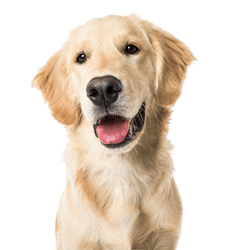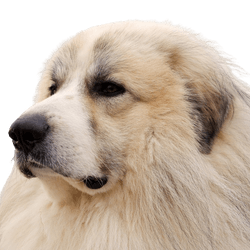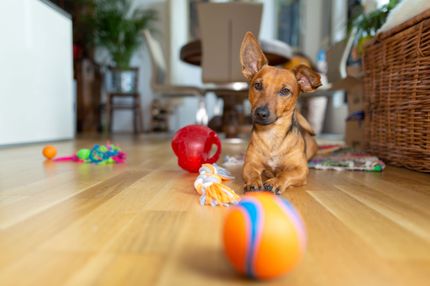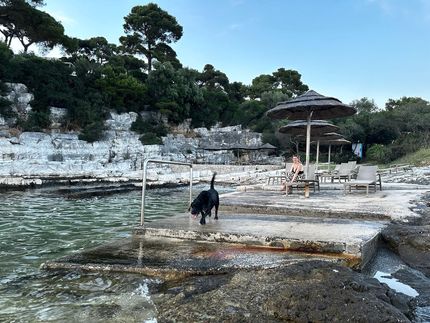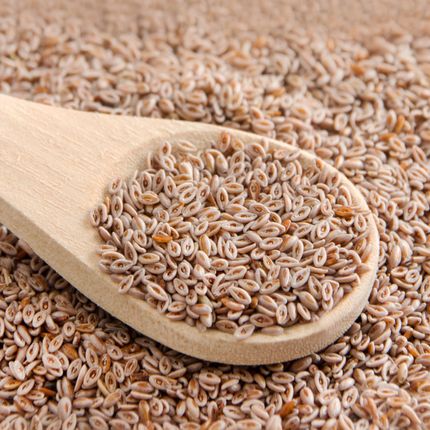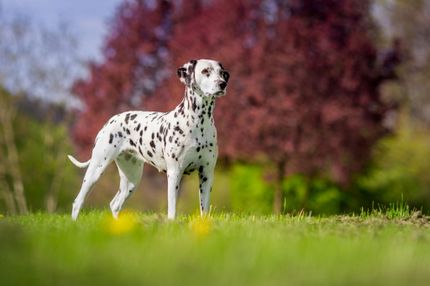Facts & Origin
Origin of the Golden Pyrenees
The Golden Pyrenees is a modern hybrid dog breed created by crossing a Golden Retriever with a Great Pyrenees (Pyrenean Mountain Dog). This combination unites two very different but extremely popular breeds: the friendly, people-oriented Golden Retriever family dog with the independent, vigilant guard dog from the Pyrenees. The aim of this breed is to combine the gentle, good-natured nature of the Retriever with the robustness, stamina and alertness of the Pyrenean dog - creating a loyal, strong and versatile companion for active families.
The origin of the Golden Pyrenees is not officially recognized by breeding associations and took place mainly in North America, where so-called "designer dogs" became increasingly popular as an alternative to purebred animals. Nevertheless, it is not an accidental crossbreed, but a deliberate mating of two established working breeds whose characteristics are deliberately combined.
Name synonyms: Golden Pyrenees or Pyrenees Retriever?
As the Golden Pyrenees is not an officially recognized breed, there are various name variants. The most commonly used are
Golden Pyrenees
Golden Retriever Pyrenees Mix
Pyrenees Retriever
Golden Pyr
All names refer to the same type of crossbreed: Golden Retriever × Great Pyrenees. Some breeders use creative proper names to market their litters, which can lead to additional terms. As there is no uniform standard, it is advisable for interested parties to ask about the origin of the parent animals, the character and the breeding objectives.
Criticism of the breed
Like many designer dogs, the Golden Pyrenees is also the subject of debate. Although the crossing of two different breeds is often seen as an attempt to utilize "hybrid vitality" (i.e. better health through genetic diversity), this only works with serious breeding. Caution is required with Golden Pyrenees in particular, as both original breeds have specific characteristics and hereditary diseases that need to be carefully checked.
Another problem is that many breeders market the breed as a gentle family dog with Pyrenean flair without pointing out the high demands on space, exercise and training. A Golden Pyrenees needs clear leadership, plenty of exercise, mental activity and fixed structures - this is not a beginner's dog that feels comfortable in a small apartment with occasional walks.
The frequent commercial motivation behind breeding is also viewed critically: high prices, hardly any proof of health, no breeding standards. Anyone interested in a Golden Pyrenees should therefore critically question whether the breeding is carried out ethically and responsibly - and whether their own everyday life is suitable for a dog of this caliber.
| Alternate Name | Golden Retriever Pyrenees Mix, Pyrenees Retriever, Golden Pyr |
| Origin | UK - France |
| Life expectancy | 10 - 12 years |
| Care requirements | high-maintenance |
| Activity level | average |
| FCI group | not recognised |
| AKC group | not recognised |
| KC group | not recognised |
More Golden Retriever mixes
More Pyrenean Mountain Dog mixes
Attitude, character and temperament of the breed
Possible character traits
The character of the Golden Pyrenean is often a fascinating mixture of gentleness and independence. From the Golden Retriever he usually brings an open, friendly, people-oriented nature, while the Pyrenean Mountain Dog is known for his quiet alertness, independence and territorial disposition. The result is often a dog that can be affectionate and cuddly, but also has a mind of its own.
Golden Pyrenees are generally very intelligent, which makes them eager to learn, but also sometimes stubborn. They have good social behavior with people they know, are often fond of children and quiet in the house. At the same time, they can be reserved or even suspicious of strangers or dogs - especially if the Pyrenean part dominates.
They need early and consistent socialization, clear rules and a loving and consistent upbringing. Drill or harshness will not get you far with this mix. But if you are prepared to invest time, patience and leadership qualities, you will get a loyal, attentive and versatile companion who can be both a family dog and a protector.
Character
Care and health: Take coat, size and preventative care seriously
As a large, long-haired mixed breed, the Golden Pyrenees has special requirements in terms of both grooming and health care. Typical hereditary diseases to look out for are:
Hip and elbow dysplasia (HD/ED)
Cancer, especially in the Golden Retriever line
Heart problems
Ear infections (in dogs with drooping ears and thick fur)
Stomach torsion, especially in large, deep-chested dogs
Allergies or skin problems that can occur in retrievers
Preventive care includes regular visits to the vet, health checks of both parents (especially HD and ED x-rays) as well as age-appropriate exercise and feeding. During rearing, care should be taken to ensure slow growth and joint-friendly exercise.
The coat is usually dense, medium to long, with a strong undercoat - in other words, it is high-maintenance. The dog should be brushed several times a week, even daily during the shedding period. Bathing is only necessary if the coat is very dirty, but regular checks of ears, eyes and paws are mandatory.
What does this crossbreed look like?
In appearance, the Golden Pyrenees combines the striking characteristics of its parents. The dogs are usually large to very large, with a strong, balanced build. The average weight is between 35 and 55 kilograms, the shoulder height can reach 65-80 cm. The build is usually broad, muscular and stable, but not heavy.
The coat is often wavy to smooth longhaired, with a strong undercoat that makes it weatherproof. In terms of color, cream, white, gold and light brown tones dominate, sometimes with contrasting markings. In some cases, the dogs appear almost completely white (typical of the Pyrenees), in other cases with a golden shimmer and soft mane - especially in the case of retriever influence.
The tail is long, bushy and slightly curved, the ears drooping, medium sized and well coated. The eyes often appear friendly and alert at the same time - a mix of retriever gentleness and Pyrenean distance. Overall, the Golden Pyrenees radiates a calm, noble presence - a mixture of gentle family dog and protective natural strength.
Known Diseases
Hip dysplasia (HD)
Hip dysplasia (HD) is a genetic condition in dogs where the hip joint is not shaped properly. This leads to pain, stiffness and restricted movement.
Elbow dysplasia (ED)
Elbow joint dysplasia is a chronic disease complex of the elbow joint of fast growing dog breeds.
Epilepsy
Definition: Dog has epilepsy if, for example, at least two epileptic seizures occur more than 24 hours apart.
Cataract
Cataracts are still one of the most common causes of blindness, even in dogs.
Progressive Retinal Atrophy (PRA)
Progressive retinal atrophy (PRA) is a slowly progressive death of the retina in dogs.
FAQ
-
Known as the Goldern Pyrenees, this large dog with lots of fur is a mix of two different breeds - the Golden Retriever and the Pyrenean Mountain Dog.
-
This mix can look very different, but in general they are large dogs with thick coats.
-
Golden Retrievers and Pyrenean Mountain Dog mixes can vary in size, but they are generally large dogs.
-
Golden Pyrenees need a lot of exercise. They are therefore not the best breed for people who live in small apartments or don't have a lot of time to walk or play with them. They also need a lot of grooming, so be prepared to spend time brushing their thick coats.
-
Yes, Golden Pyrenees are generally good with children. They are gentle, loving dogs who enjoy being with people.
